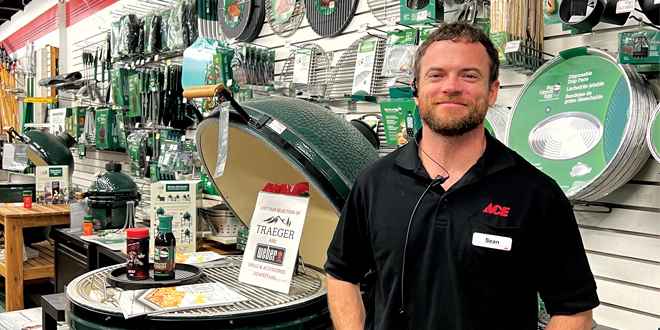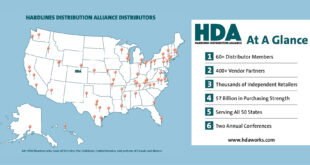If you think of sales as the engine that drives your business, then every employee is a moving part in that engine. But they’re not merely “cogs in a wheel,” because if anyone fails to do their part, the entire apparatus will stall.
In fact, employees with a cog-in-a-wheel mentality—the feeling that what they do on a day-to-day basis doesn’t matter—can actually do a lot of damage. Disengaged employees may deliver poor customer service, which kills sales. Your business will flourish when you build a culture where staff takes ownership of their roles and understands the importance of their contributions.
A culture of selling is one where everyone in the business, from leadership to front-line associates, all actively work together to meet the same goals of customer satisfaction and sales growth. If that sounds like a slice of retail utopia, it’s not as out of reach as you might think. Hardware Retailing spoke with three retailers who are engaging their teams in achieving sales goals. Their insights offer practical steps for creating a culture of selling where all employees are customer focused, collaborating and contributing to the overall growth and success of the business.
Establish Clear Goals Using KPIs
One basic component to establishing a culture of selling is to understand what you want to achieve and why. Identify the big-picture challenges your company faces and then create specific goals to solve them.
 At Bill’s Ace Hardware in Arlington, Virginia, Sean and Allison Ploskina utilized organizational development services from the North American Hardware and Paint Association (NHPA) to address training.
At Bill’s Ace Hardware in Arlington, Virginia, Sean and Allison Ploskina utilized organizational development services from the North American Hardware and Paint Association (NHPA) to address training.
Kim Peffley, NHPA director of organizational development and consulting, helped them address challenges they identified when they took over the business in 2021. A period of prosperity during 2020 and 2021 had the unfortunate side effect of sidelining some of the customer service and training best practices that made the business successful in the past.
“We wanted to create an effective framework of communication and training between management and our staff so everyone had clear expectations and resources were available to meet those expectations,” Sean says.
The Ploskinas say it’s important to have clear and achievable goals where each individual understands their contribution. Using metrics from key performance indicators (KPIs), they created weekly scorecards with performance goals, such as average ticket growth, reward scan rate, shrinkage and team training completion rates.
All employees see some version of the card. Front-line sales associates see a scorecard with average ticket size and scan rates of customer loyalty cards, as the Ploskinas have used these numbers to create employee incentive programs. Managers see a more complete version of the scorecard, as they have the biggest responsibility in meeting those goals. The Ploskinas check on progress during regular calls with their general manager.
With clear goals in mind, measuring success is easy; either you hit the goal or you didn’t. However, everyone needs to know how they can influence the outcome. The Ploskinas say it’s especially important for store managers to understand their level of accountability.
“Coaching is directly tied to sales,” Sean says. “The more coaching the staff received from our general manager, the better sales were. Once he understood that he can directly influence these KPIs through his interaction with staff, customer count and overall sales went up. Thanks to a consistent dialogue and accountability with our management team to focus on specific KPIs, we are seeing great results in the revenue for further investment back into the business.”
Create Goals for Employee Behavior
At Hill Country Paints, with locations in Waco, College Station and three in Houston, Texas, employee development manager Steven Hill faces the challenge of growing sales and attracting new customer segments amid heavy competition.
 A culture of selling will play a large role in moving the business forward, he says, as it will foster engagement, positive attitudes and a sense of shared responsibility. Engaged employees will build loyal customers, which build sales through repeat business and differentiates Hill Country Paints from neighboring big boxes.
A culture of selling will play a large role in moving the business forward, he says, as it will foster engagement, positive attitudes and a sense of shared responsibility. Engaged employees will build loyal customers, which build sales through repeat business and differentiates Hill Country Paints from neighboring big boxes.
“Engaged and satisfied employees are more likely to perform well,” Hill says. “I measure engagement through employee surveys and track employee development through indicators such as training performance and certifications they’ve achieved.”
The survey includes questions such as, “What are your short-term and long-term goals as an employee of a retail paint store? List at least one goal for each category and explain how you plan to achieve them,” and “What are the resources or support that you need to improve or develop in your job? List at least three resources or support that you think would help you achieve your goals and explain how they would benefit you.”
Knowing an employee’s goals and training needs helps build their engagement, which in turn builds a positive culture.
“Any training we do must address culture. Culture has to be second nature to everyone in the company,” Hill says. “Our staff needs to have a positive attitude and sense of belonging with the company as a whole and with their co-workers.”
Develop Consistent Training
Consistent and regular training is another key component of a culture of selling. A well-rounded approach will include customer service skills and product knowledge. Additionally, managers must understand how to coach and lead.
At Bill’s Ace Hardware, the Ploskinas used formalized training from their wholesaler and NHPA alongside coaching and incentives.
“To reach our sales goals, we prioritize training toward an identified area of opportunity for our team each month, such as product knowledge, customer service or continuous improvement in technology platforms,” Allison says. “We provide clear objectives and offer incentives for those who meet or exceed the goals for improvement.”
As with any team, some people need more time to learn, which provides opportunities for coaching.
“We identify areas for coaching early in an employee’s training, using that time to show that the selling behaviors that drive results are within their control and rooted in the coursework they’ve already taken,” Allison says.
Teach Solution-Based Sales
When teaching selling skills, be prepared to challenge preconceived notions employees may have about selling.
 “When I first got into sales, I hated being called a salesman because there’s some stigma that comes along with that,” says Grant Sherfick, owner of H&H Hometown Hardware in Shoals, Indiana. “But the more experience I got, the more I learned it was all about attitude.”
“When I first got into sales, I hated being called a salesman because there’s some stigma that comes along with that,” says Grant Sherfick, owner of H&H Hometown Hardware in Shoals, Indiana. “But the more experience I got, the more I learned it was all about attitude.”
Sherfick wants his staff to have the right attitude toward selling and realize that being a salesperson shouldn’t have negative connotations. Selling isn’t merely about creating a transaction; it’s about helping people solve a problem. Instilling that idea is key to employee development.
“We’re in the business to sell, but we also have an opportunity to help people,” he says. “Sales can be positive and rewarding.”
Sherfick begins employee training by emphasizing that sales is part of everyone’s job description, no matter their role in the business. He uses online training from his wholesaler and from NHPA to teach product knowledge and selling skills while supplementing it with real-life examples. If he’s helping a customer, Sherfick will bring another employee alongside to listen in and understand how to conduct the sale.
“We emphasize a solution-based approach to sales,” Sherfick says. “Listen to the customer, find out what problem they’re trying to solve and have a conversation with them. As you help them find a solution, you begin to open up opportunities for add-on sales.”
A solution-based approach to selling isn’t always intuitive, either, he says, so it may take some coaching, demonstration and trial-and-error for employees to become proficient.
Cultivate the Sales Mentality
To encourage a culture of selling at Hill Country Paints, Hill starts by teaching employees to ask good questions. While it sounds simple, employees often don’t ask questions beyond the standard greeting of “How may I help you,” or “What project are you working on today?”
Those opening questions should only be the beginning of the conversation with both retail and contractor customers.
“Don’t let a customer come and order a gallon of paint without asking if they have everything they need for their job,” Hill says. “These aren’t hard sales questions; you’re just taking an interest in what the customer is doing.”
Hill demonstrates for employees how even if the customer adds a single brush to the sale, it makes a difference in the margin and overall profit. Like Sherfick, Hill says employees may need to be coached and have a firsthand look at the sales process before they fully understand it.
“For them to understand, sometimes it takes that lightbulb moment when they finally make the connection between the relationship they’re building with the customer and sales,” Hill says. “That’s the difference between hearing us talk about a culture of selling and actually seeing it in action.”
Even with all of the right training in place, sales can be difficult, Hill admits. He says it’s important to teach them to handle those difficulties and persevere.
“I give employees some advice my wife gave me, which was that to be successful in sales, you have to cultivate grit,” he says. “Customers will tell you ‘no’ a lot more than they’ll tell you ‘yes.’ Talent alone won’t bring success, you’ll need some grit. When you get a negative response, don’t take it personally. Use it as an opportunity to learn.”
Encourage Collaboration
If sustaining a culture of selling is a collective effort among all staff, then collaboration and communication are essential. Technology, as well as basic interpersonal skills, are tools managers can use.
The Ploskinas live four hours away from their store, making it especially important they are intentional with their communication. They use organization software Trello to provide news updates and tasks to every team member.
“As soon as one of our employees logs into their Trello account, the first thing they see are Bill’s Ace Hardware’s core values. Putting the customer first is at the top of the list,” Sean says. “Employees all know what’s important, and we look for any way we can reinforce that.”
Allison also holds one-on-one Zoom calls with each of their employees once a month. Conversations are meant to be casual and wide ranging, from talking about their personal life to specific challenges they may be having at the store.
“We’ve received some good signals in these calls about areas of the business where we need to give more focus or aspects we need to change,” she says. “We also make sure to thank the team for what they’re doing and reinforce that we’re helping them reach their full potential in their work.”
Get Employee Buy-in
Any effort to create a culture of selling, whether through communication or training, must be undergirded with collaboration. Hill wants every employee to be trained on every aspect of the business, which includes giving front-line employees a basic understanding of the operational side of the business.
Even if they’re learning a skill they won’t use all of the time, they are getting a fuller picture of how the business works. That training helps them understand the “why” behind what they do.
“Once employees understand why we do what we do as an organization, when they buy into the value system, they are motivated and excited to work here,” Hill says. “That excitement translates into sales because when customers see happy, knowledgeable employees, that becomes the main differentiating factor between us and the competition.”
He says it’s also important to seek input from employees and let them know you value their opinions. Allowing employees to express opinions and be creative fosters the sense of collaboration and collective effort important to a culture of selling. Especially among veteran employees, introducing a new idea or recommending training may be met with resistance. Hill asks them to approach the company’s directives with an open mind, and he promises to do the same with any ideas they might have.
“I’ll ask that if they don’t agree with what we’re asking, they try it first in earnest, and if it doesn’t work, we may change tactics,” he says. “We want employees to feel they’re empowered to do their jobs and have the freedom to give input. We want them to use their own expressions of creativity and personality to enrich the customer experiences, because this will help make everyone better.”
Thank Your Employees
Finally, if you want to create a positive culture where everyone is engaged and selling, thank them for their hard work. Simple gestures of appreciation will go a long way towards reinforcing good behavior. Meaningful gestures could be a verbal thank you, a handwritten note or providing lunch on a day that is busier than normal.
Hill urges his managers to understand that employees are their most important resource; they’re the ones often going home late or getting to the store early to get a job done. It’s important for managers to show their appreciation. Even veteran employees will appreciate a supportive word.
“It doesn’t cost you anything to be nice to someone or give a compliment, but it has a huge impact on them,” he says. “I’ve seen firsthand how the employee’s attitude and energy level changes with just a simple thank you and good job.”
Energize Sales: 6 Ways to Involve Employees
Incentives provide a learning opportunity and build excitement and engagement for staff. Use them to encourage the behaviors you want your employees doing to drive customers back into the store. Here are some practical solutions for encouraging employees to improve their selling skills.
Loyalty Program Scan Rates
To boost participation in their loyalty club last year, the Ploskinas from Bill’s Ace Hardware offered rewards to employees who met monthly loyalty goals and gained more than 2,000 new members. They coach staff how to promote the value of the program and tactfully ask customers to sign up.
5-Star Reviews
Many customers turn to social media before visiting a business. In the store, the Ploskinas post QR codes linking to the store’s Google review page, and employees ask customers to offer reviews. If a customer calls out an employee in a positive review, the Ploskinas give that employee $20 cash.
Add-on Sales Contest
To drive up average transaction size, the Ploskinas issued an impulse item challenge. Each employee chose an item to display around the sales counter. The employee who chose the highest-selling product received a cash incentive. Sean says the challenge drives average ticket growth and encourages staff to learn more about the products in the store.
Featured Products Challenge
When the Ploskinas were trying to close out a line of grills, they offered employees a $100 bonus to everyone who sold one. The investment in an incentive is worth the inventory space and cash it will free up. And major sales offer an opportunity for employees to practice add-on selling.
Social Media Promotions
When Sherfick opened H&H Hometown Hardware in late 2023, he profiled each employee on the company’s social media platforms. Then he had each employee select an item to promote on social media. Initial posts received a lot of attention, even without paying to boost the content. Sherfick now uses a curated selection of items and scripts for a streamlined approach.
Nonprofit Donations
Sherfick asks employees to choose a local nonprofit organization and during a promotional period, proceeds from the store’s sales will go to that nonprofit. Knowing where some of the proceeds are going gives staff an extra incentive to sell.
 Hardware Retailing The Industry's Source for Insights and Information
Hardware Retailing The Industry's Source for Insights and Information








